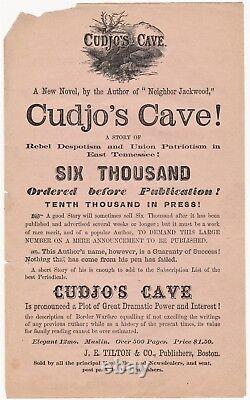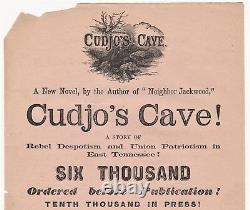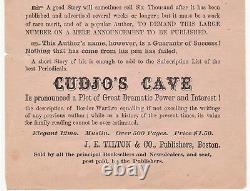
- Index
- Author
- Benson J Lossing (7)
- Benson J. Lossing (11)
- Bruce Catton (6)
- George Bancroft (7)
- Harper (8)
- J. T. Trowbridge (5)
- J.t. Headley (6)
- John H. Thillman (6)
- Louisa May Alcott (38)
- Margaret Mitchell (6)
- Mixed Authors (46)
- Prof Allen E. Fowler (6)
- Rossiter Johnson (6)
- Shelby Foote (62)
- Thomas Mealey Harris (9)
- Time Life (14)
- Ulysses S. Grant (11)
- Unknown (24)
- Various (63)
- Various Authors (21)
- Other (1888)
- Binding
- Publisher
- Broadfoot (9)
- Bunce & Huntington (10)
- Charles L. Webster (9)
- Easton Press (105)
- Harper & Brothers (10)
- J H Moore & Company (6)
- Jones & Stanley (6)
- L. Stebbins (10)
- Lange & Hillman (5)
- Macmillan (5)
- Marvel Comics (9)
- Morningside (19)
- Random House (17)
- Rapidan Press (5)
- Sherman Publishing (8)
- The State Company (6)
- Time Life (10)
- Time Life Books (79)
- Time-life Books (10)
- Unknown (14)
- Other (1898)
- Subject
- American History (8)
- Americana (45)
- Art & Photography (3)
- Bible (14)
- Books On Collecting (3)
- Children's (2)
- Civil War (47)
- Congressional Record (3)
- Gettysburg Cemetery (2)
- Hardcover W / Jacket (2)
- History (296)
- Illustrated (6)
- Law & Government (11)
- Literature & Fiction (65)
- Military & War (690)
- Military History (3)
- Poetry (2)
- Reference (9)
- Scarlett O Hara (2)
- Science & Medicine (7)
- Other (1030)
- Topic
- Agriculture (8)
- American (us) (19)
- American Civil War (5)
- American History (6)
- Bible (10)
- Books (7)
- Books, Civil War (30)
- Christianity, Bibles (71)
- Civil War (233)
- Civil War (1861-65) (901)
- Civil War, War (6)
- Classics (45)
- Historical (46)
- History (10)
- Literature (7)
- Military (20)
- Poetry (6)
- Religion (6)
- The Civil War (5)
- United States (20)
- Other (789)
- Year Printed
RARE Civil War Broadside 1864 Book Cudjo's Cave by John Townsend Trowbridge





Civil War - Slavery related Novel. FOR OFFER - a nice old broadside. Fresh from a local estate in Upstate Western NY - Never offered on the market before. All original, vintage, old, antique - guaranteed. A New Novel by the author of "Neighbor Jackwood".
A Story of Rebel Despotism and Union Patriotism in East Tennessee. Measures 9 1/2 x 5 3/4 inches. A few dings to edge, a couple small rips at edge.
If you collect American history, Americana, 19th century sign printing, type face / movable type press, advertisement ad, literature, etc. This is a wonderful, unique item for your paper or ephemera collection.Gap Cave is located just underneath Pinnacle Overlook in the Cumberland Gap National Historical Park, Lee County, Virginia. Currently, the cave has a surveyed length of 18.5 miles and is the 42nd longest cave in the United States and 154th in the world. [1] There are six known entrances: the Gap Cave Entrance (also known as the King Solomons Cave Entrance), an artificial entrance, known as the Cudjo's Cave Entrance, the Stream Entrance, the Soldiers Cave Entrance, the Big Saltpeter Cave Entrance, and the Wellhole. All lead into the same cave, Gap Cave. Throughout the years Gap Cave has had many names.
It was named first by Dr. Thomas Walker in 1750, who named it Gap Cave. Walker was the guardian of young Thomas Jefferson after Jefferson's father's death. Daniel Boone passed through Cumberland Gap in 1775 and must have also seen the cave's entrance. Boone and his contemporary, an African American, Monk Estill, are the first on record to have made gunpowder in Kentucky.
Saltpeter mining at Cumberland Gap may well have begun before 1800. [2] An adjacent cave, sometimes referred to as Soldiers Cave, was explored by Confederate and Union soldiers as well as Gap Cave. Local historians say armies used Soldiers cave as a military hospital and for storage. Names and dates inscribed along the cavern walls document military presence. There is evidence that the greater part of the Gap Cave system was used to mine for Saltpeter in the 1800s and became known as the Saltpeter Cave.
In the later 1890s commercial tours of the cave system began in Gap cave, then known as King Solomon's Cave. Electric lighting was installed in Soldiers Cave and a tunnel was dug to later connect King Solomon's Cave with Soldiers Cave. Trowbridge published a novel (Cudjos Cave) about a slave that had escaped from slavery and was hiding out in a cave in the Cumberland Gap.
This book was quite famous at the time and the setting for Cudjos is approximately the same as Gap Cave. The cave owners changed the cave's name to Cudjo's Cave to attract tourists. In March 1920 Lincoln Memorial University bought the caverns and surrounding land from private owners. [4], and in 1934 the Gap cave was re-opened to the public. In 1947 the title was transferred to the Commonwealth of Virginia.
Commercial tours of the caverns began by the National Park Service in 1992. From 1992 until somewhat recently cave tours were not being held. Gap Cave had been vandalized, broken light bulbs were around every corner, graffiti was on nearly every wall, and the stairs and bridges were very unstable. In the early 1990s a concept plan was drawn up to restore the Cumberland Gap, including Gap Cave.
The restoration was completed in the late 1990s to the early 2000s; the cave is nearly back to its original condition and tours now run off lantern light instead of electricity. 2015, 18.5 miles of passage has been mapped by CRF. John Townsend Trowbridge (September 18, 1827 - February 12, 1916) was an American author. Birthplace of John Townsend Trowbridge. Showing the out-door oven and the Rochester Road. Drawn by Charles Copeland, from descriptions furnished by John T. Trowbridge and his eldest sister Mrs. Trowbridge was born in Ogden, New York, to Windsor Stone Trowbridge and Rebecca Willey.His birthplace was a log cabin his father constructed through the use of wooden pegs. Trowbridge received an unremarkable education, but had an early interest in literature. He recalled in his autobiography that he wrote his first poem at age 13.
His first published work was published anonymously in the Rochester Republican when he was 16. He started working as a teacher and on a farm for one year in Illinois. In 1847, at age 19, he moved to New York City to become an author and, with the assistance of Mordecai Manuel Noah, began publishing in periodicals while also working at a pencil case engraving factory. [2] He moved to Boston in August 1848, and in 1850, during the absence of Benjamin Perley Poore in Washington, D.Edited Poore's paper, the Sentinel, but his editorial on the fugitive-slave law nearly destroyed the paper's popularity. He married Cornelia Warren (May 1, 1834 - March 23, 1864) in 1860. Trowbridge's house at 152 Pleasant Street, Arlington, Massachusetts.
In June 1867 Trowbridge bought a house at 152 Pleasant Street, Arlington, Massachusetts where he lived until his death in 1916. Trowbridge also spent much time in Kennebunkport, Maine, where he built Spouting Rock Cottage, near to Spouting Rock and Blowing Cave, both of which he named. His novels include Neighbor Jackwood (1857), an antislavery novel; The Old Battle-Ground (1859); Cudjo's Cave (1864); The Three Scouts (1865); Lucy Arlyn (1866); Neighbors' Wives (1867); Coupon Bonds, and Other Stories (1873); and Farnell's Folly.
Another is Evening At The Farm. Trowbridge wrote numerous works under the pseudonym of Paul Creyton, including The Midshipman's Revenge (1849), Kate the Accomplice, or, The Preacher and the Burglar (1849), The Deserted Family, or, Wanderings of an Outcast (1853), Father Brighthopes, or, An Old Clergyman's Vacation (1853), Burr Cliff: its Sunshine and its Clouds (1853); Martin Merrivale: His X Mark (1854), Iron Thorpe (1855), Neighbor Jackwood (1857). Among his very many juvenile tales are The Drummer Boy, The Prize Cup, The Lottery Ticket, The Tide-Mill Stories, The Toby Trafford Series, The Little Master, and the Jack Hazard series. His published volumes of verse include: The Vagabonds, and Other Poems; The Emigrant's Story, and Other Poems; A Home Idyl, and Other Poems; The Lost Earl; and The Book of Gold, and Other Poems. The Vagabonds, At Sea, and Midsummer are among his best-known poems.
His long poem Guy Vernon: A Novelette in Verse was first published anonymously in the compilation A Masque of Poets (1878). In Darius Green and his Flying Machine, Trowbridge penned the following prophetic verse: Darius was clearly of the opinion / That the air is also man's dominion / And that with paddle or fin or pinion, / We soon or late shall navigate / The azure as now we sail the sea. Trowbridge toured much of the defeated Confederacy during the summer of 1865 and the following winter. He observed carefully, and talked with a wide variety of people of both sexes, including freedmen, die-hard Rebels, Unionists, farmers, businessmen, refugees, and Northern entrepreneurs. In his book, he lets these people speak in their own voices, often adding his own comments. All three accounts are written from the perspective of a loyal and fair Northerner genuinely concerned about conditions in the South and the evolving policies of the United States towards that section.From 1870 to 1873 Trowbridge was co-editor with Lucy Larcom of Our Young Folks. [4][5] Since his death he has been well known as a friend of Mark Twain and Walt Whitman. Trowbridge's papers are located at Houghton Library at Harvard University.
The Midshipman's Revenge (1849). Kate the Accomplice, or, The Preacher and the Burglar (1849).
The Deserted Family, or, Wanderings of an Outcast (1853). Father Brighthopes, or, An Old Clergyman's Vacation (1853).
Burr Cliff: its Sunshine and its Clouds (1853). Martin Merrivale: His X Mark (1854). Coupon Bonds, and Other Stories (1873). Guy Vernon: A Novelette in Verse (1878).
This item is in the category "Books & Magazines\Antiquarian & Collectible". The seller is "dalebooks" and is located in this country: US. This item can be shipped worldwide.
- Subject: Americana
- Original/Facsimile: Original
- Place of Publication: Boston
- Region: North America
- Topic: Civil War (1861-65)
- Special Attributes: Illustrated
- Year Printed: 1864
- Language: English
- Country/Region of Manufacture: United States

